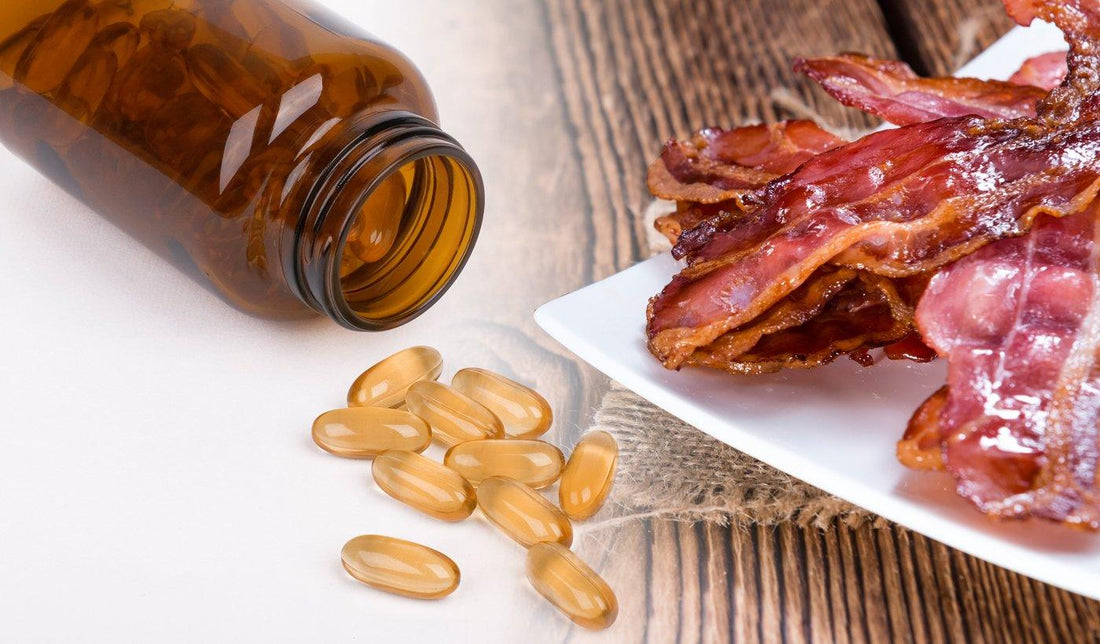

L-Carnitine Supplementation Benefits Low Carb/High Fat Diets
Table of Contents
Carnitine is biosynthesized from the amino acids lysine and methionine. L-carnitine can be found in red meat, fish, poultry, and milk. Carnitine helps move fatty acids through the body, allowing the cells to break down fat and use fat deposit stores. The highest concentrations of L-carnitine can be found in red meat. As a result, those on a vegan/ vegetarian diet or those who restrict red meat intake will be most likely to have a deficiency. For example, 100g of beef steak has 94mg of L-carnitine, 100g of chicken breast has 3.9mg of L-carnitine, and 100g of asparagus has 0.195mg of L-carnitine. Additionally, carnitine also has potent antioxidant properties similar to vitamin C and vitamin E by reducing free radical damage.
Earlier studies reported that free-carnitine content in skeletal muscle is reduced during high-intensity exercise or when skeletal muscle glycogen content is elevated, and this reduction in carnitine might be rate-limiting for β- oxidation and also demonstrated a rise in free- carnitine pool intern increases long-chain fatty acid oxidation. A recent study reported that carnitine can also improve sprinting capacity by lowering lactic acid production and preventing fatigue. Some studies hypothesized that L-Carnitine supplementation improves exercise performance through various mechanisms, including enhanced muscle fatty acid oxidation, spares glycogen, and altered muscle fatigue resistance or postpones fatigue during exercise.
 |
A new study published in the Journal of Physiological Biochemistry reported that low carb, high fat dieters may benefit from carnitine supplementation. Ninety male rats were supplemented with different concentrations of L-carnitine supplementation (0.15, 0.3, and 0.5 %) and fat content (5, 10, and 15 %) through diet in various combinations.
Animals in each diet group were further subdivided into five subgroups:
|
(a) sedentary, |
The researchers made the rats exercise to complete exhaustion, so how do you get a rat motivated? The researchers kept the rats in the water and measured how long it was until they could no longer keep their head above water. The rats would be so tired they would start sinking to the bottom…yikes!! Some of the animals were given L-carnitine and others were not. The human equivalent of the dose that the researchers used would be about 2-4 g L-carnitine a day.
At the end of the study, the rats that were given L-Carnitine had increased endurance capacity compared to those that were not given L-Carnitine on a high fat diet. The rats that were given L-Carnitine had spared muscle glycogen levels and increased fat oxidation which may have contributed to the improved endurance performance. The rats consuming L-carnitine also had reduced lactic acid levels during exercise as well. Another interesting finding was that the groups taking L-carnitine had lower markers of muscle damage and also greater anti-oxidant protection compared to the control group. The L-carnitine supplementation increased the levels of endogenous antioxidant status as well. Thus, L-carnitine can act as a potent antioxidant and interact with endogenous antioxidants for synergistic effects to defend against fatigue.
Answers You Want To Know
1. What is l carnitine and why is it important?
L carnitine is an amino acid that helps in the metabolism of fat and the conversion of food into energy. It has been shown to help with weight loss, improve cognitive function, and lessen symptoms of heart disease as well as other conditions. Supplemental l carnitine can be taken anywhere from 3 months to 12 years before complications may arise. Always speak with a healthcare professional before starting any new supplement regimen.
2. Is l carnitine safe to take?
There are a few positives to taking l carnitine supplements. For one, it is a nutrient found in meat and dairy that has been shown to help with weight loss and fatty liver disease. It is also recommended to take l carnitine if you are on a low carb or high fat diet as it helps the body burn more calories. However, always speak to your doctor before starting any new supplement, especially if you have health concerns. Additionally, l carnitine may cause some side effects such as diarrhea, nausea, vomiting, heartburn, muscle cramps, and more. So, be sure to speak to your doctor before supplementing with l carnitine.
3. How much l carnitine should I take per day?
There is no one-size-fits-all answer to this question as l carnitine dosage can vary depending on your physical condition, dietary needs, and supplementation protocol. However, generally speaking, it's important to start with a low dose and gradually increase it until you find your optimal dosage. Furthermore, l carnitine helps in boosting the efficiency of fatty acids when burned for energy, aiding in weight loss and reducing inflammation. Additionally, l carnitine has been shown to improve heart health, cognitive function, muscle performance, and red blood cell production. Therefore, before starting any supplement regimen, always speak to your doctor or health expert to find out what dosage would be best for you.
4. Are there any side effects to taking l carnitine supplements?
There are no reported side effects of taking l carnitine supplements as long as you are following the recommended dosage. l Carnitine helps in energy production and mitochondrial biogenesis, which is why it has been touted for its many health benefits on a low carbohydrate/high fat diet. Taking l carnitine before or after exercise can also improve performance and help in burning more calories.
5. How often should I take l carnitine to achieve desirable results?
There is no definitive answer to this question as it depends on a number of factors - such as your bodyweight and sex, your current diet regimen, and the dosage you need to take. However, l carnitine can help to burn fat and increase energy levels, improve joint health, weight loss, better cognitive function, and decrease inflammation. The dosage you need to take depends on these factors as well as your bodyweight and sex. It's best to start with lower doses for first-time users and gradually increase the dose over time until you reach the desired results.
Words From Infinite Labs
L-carnitine supplementation can benefit people on low carb and high fat diets by helping to increase energy levels, decrease fat storage, and improve performance. Make sure to talk to your doctor before supplementing with L-carnitine, as there are possible side effects associated with this supplement. However, with careful supplementation, you can reap the many benefits of L-carnitine supplementation for your low carb or high fat diet.
Recent posts
Featured Products

















